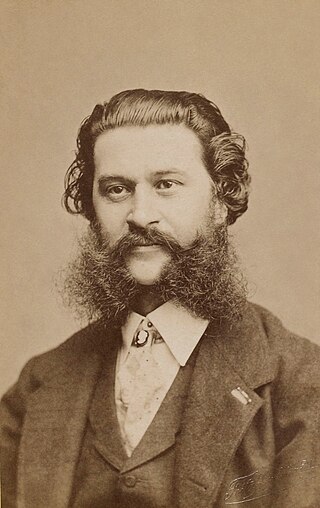
Johann Baptist Strauss II, also known as Johann Strauss Jr., the Younger or the Son, was an Austrian composer of light music, particularly dance music and operettas as well as a violinist. He composed over 500 waltzes, polkas, quadrilles, and other types of dance music, as well as several operettas and a ballet. In his lifetime, he was known as "The Waltz King", and was largely responsible for the popularity of the waltz in Vienna during the 19th century. Some of Johann Strauss's most famous works include "The Blue Danube", "Kaiser-Walzer", "Tales from the Vienna Woods", "Frühlingsstimmen", and the "Tritsch-Tratsch-Polka". Among his operettas, Die Fledermaus and Der Zigeunerbaron are the best known.
The polka-mazurka is a dance, musically similar to the mazurka, but danced much like the polka. Many polka-mazurkas were composed by Johann Strauss II and his family. Johann Strauss I did not compose any of this type of music; the first polka-mazurka example written by the Strauss family was in the year 1854 by Johann Strauss II, entitled La Viennoise op. 144.The polka-mazurka was not credited to the Strauss family alone, as many Viennese composers in the 1850s era also wrote many examples. This variant of the polka was seen as cross-cultural, as many of its influences can be seen in the French-polka with its feminine and deliberate steps as well as the exciting schnell-polka, where Eduard Strauss composed many famous pieces of this type.
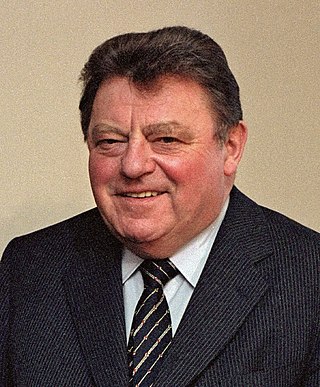
Franz Josef Strauss was a German politician. He was the long-time chairman of the Christian Social Union in Bavaria (CSU) from 1961 until 1988, member of the federal cabinet in different positions between 1953 and 1969 and minister-president of the state of Bavaria from 1978 until 1988. Strauss is also credited as a co-founder of European aerospace conglomerate Airbus.

Josef Strauss was an Austrian composer.

Das Veilchen vom Montmartre is an operetta in 3 acts by Hungarian composer Emmerich Kálmán. The libretto was written by Julius Brammer and Alfred Grünwald. It premiered in Vienna at the Johann Strauss Theater on 21 March 1930.

Franz Josef Strauss was a German musician. He was a composer, a virtuoso horn player and accomplished performer on the guitar, clarinet and viola. He was principal horn player of the Bavarian Court Opera for more than 40 years, a teacher at the Royal School of Music, Munich, and a conductor.

Johann Maria Eduard Strauss III was an Austrian composer whose father was Eduard Strauss, whose uncles were Johann Strauss II and Josef Strauss, and whose grandfather was Johann Strauss I. Born in Vienna, he was unofficially entrusted with the task of upholding his family's tradition after the dissolution of the Strauss Orchestra by his father in 1901. His talents were not fully realized during his lifetime as musical tastes had changed in the Silver Age with more popular composers such as Franz Lehár and Oscar Straus dominating the Viennese musical scene with their operettas, although his uncle, Johann Strauss II, supervised his development as a musician, a fact disputed by Eduard Strauss.

The "Radetzky March", Op. 228, is a march composed by Johann Strauss (Senior) which was first performed on 31 August 1848 in Vienna to celebrate the victory of the Austrian Empire under Field Marshal Joseph Radetzky von Radetz over the Italian forces at the Battle of Custoza, during the First Italian War of Independence. It has been noted that its tone is more celebratory than martial, but nevertheless it soon became popular among regimented marching soldiers.
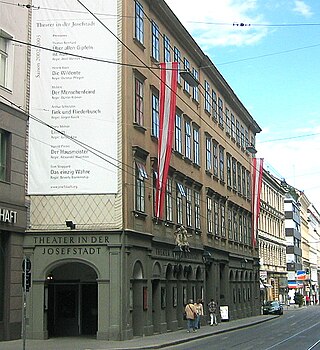
The Theater in der Josefstadt is a theater in Vienna in the eighth district of Josefstadt. It was founded in 1788 and is the oldest still performing theater in Vienna. It is often referred to colloquially as simply Die Josefstadt.
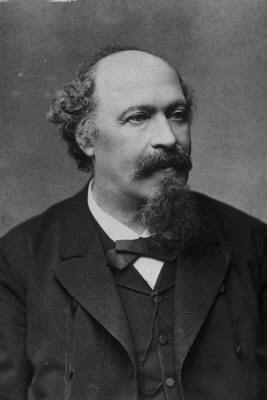
August Karl Silberstein was an Austrian writer, born in Buda, Austrian Empire.
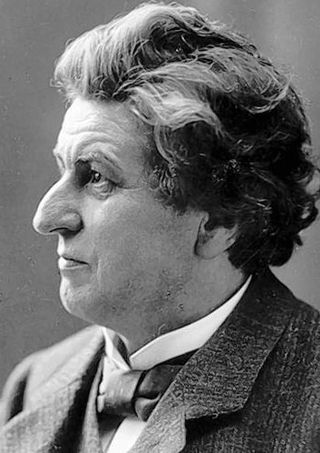
Cyrill Kistler was a German composer, music theoretician, Music educator and Music publisher.
Max Schönherr was an Austrian composer, arranger and conductor.

The orchestral Dance Suite from Keyboard Pieces by François Couperin, TrV 245 was composed by Richard Strauss in 1923 and consists of eight movements, each one based on a selection of pieces from François Couperin's Pièces de Clavecin written for the solo harpsichord over the period 1713 to 1730. It is also sometimes referred to as simply The Couperin Suite.

Dorfschwalben aus Österreich, Op. 164, is a Viennese waltz composed by Josef Strauss in 1864 or 1865.

"Zueignung" is a Lied composed by Richard Strauss in 1885, setting a poem by the Austrian poet Hermann von Gilm. It was included in Strauss's first published collection of songs, as Op. 10 in 1885. Originally scored for voice and piano, the song was orchestrated in 1932 by the German conductor Robert Heger and in 1940 by Strauss himself. It is one of the composer's best-known songs.
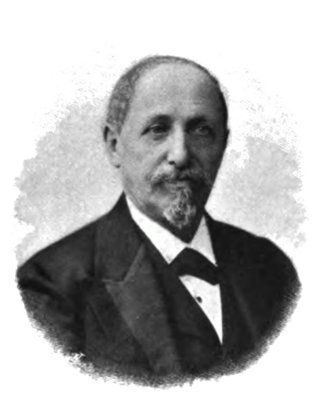
Josef Löwy was an Austrian painter, publisher, industrialist and Imperial and Royal court photographer.
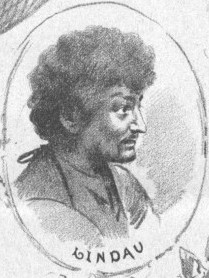
Karl Lindau was an Austrian actor and writer. He excelled in comic roles at the Theater an der Wien, and wrote several plays, librettos for operettas and songs.
In music, Op. 164 stands for Opus number 164. Compositions that are assigned this number include:
In music, Op. 166 stands for Opus number 166. Compositions that are assigned this number include:














